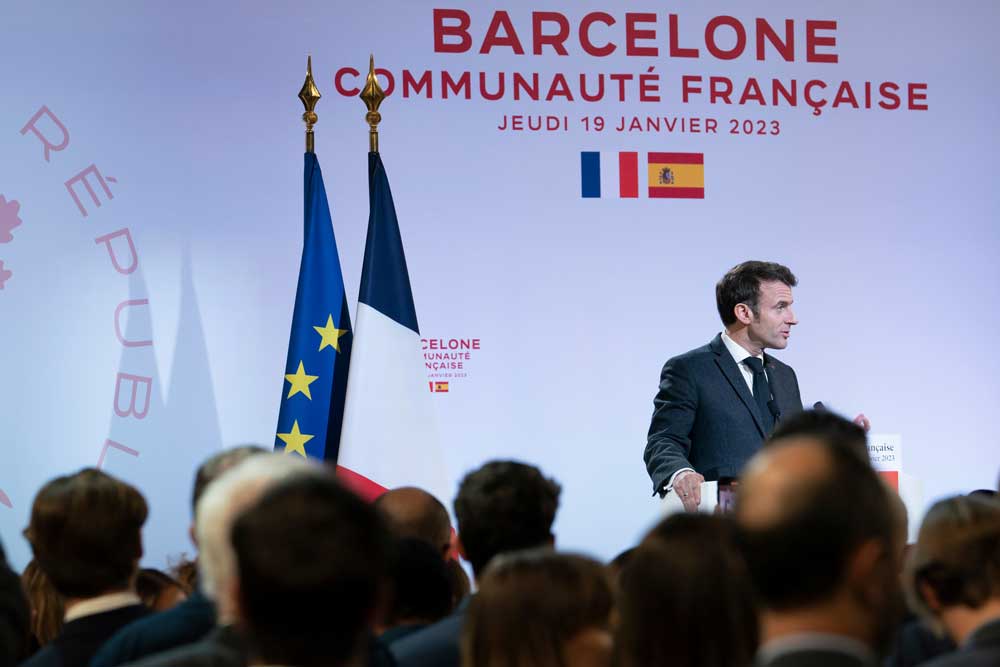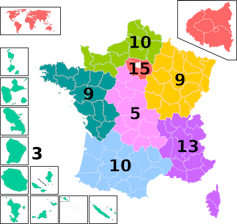
By Julien Robin
Snap elections in France: a political scientist lays out what’s at stake
Julien Robin, Université de Montréal
Speaking at a surprise address to the nation on on June 9, French president Emmanuel Macron told French citizens he had “decided to give [them] back the choice of our parliamentary future through the vote”. These words, pronounced in reaction to the historic surge of the far-right National Rally at the European elections, triggered the dissolution of France’s parliament and snap elections on 30 June and 7 July. Clea Chakraverty of The Conversation France spoke to the French parliament specialist, Julien Robin, to understand what the decision could mean for French politics.
Clea Chakraverty: How can European results have such an impact on the French parliament?
Julien Robin: For a long time, the European vote was considered to be of “second order” – a term coined by political scientists Karlheinz Reif and Hermann Schmitt to describe the first European elections in 1979. These were elections that were not national, and in which voter turnout was often lower than in “first-order” elections.
However, since the 2014 European elections, voter turnout has been on the rise, at 42.43% – that’s 1.8 points higher than in 2009. This trend is confirmed by the 2024 ballot, which will have galvanised more voters than in 2019 (+2.5 points compared to the turnout of 50.12% in 2019). Turnout is now at its highest since the 1994 European elections.
Another element to have strengthened European elections is the 2019 reform of the voting system. Whereas deputies for the European elections in France were previously divided in eight regional electoral constituencies (see figure 1), the voting system now only comprises a single national constituency. This has allowed voters to better identify candidates as well as the issues at stake.

Wikimedia, CC BY-SA
Above all, these elections have now become a referendum on Macron and an electoral springboard for political forces (notably the National Rally, the left-wing politician Jean-Luc Mélenchon’s France Unbowed, and even centrist Renaissance).
In recent days, we have been able to see the election take on a further national character through the format of television debates. Take, for example, the two-way debate between the far-right candidate Jordan Bardella and Prime Minister Gabriel Attal, on 24 May, or Macron’s proposal to debate Marine Le Pen as part of the European elections campaign. These events echo the presidential election of 2022, or even give a possible foretaste of that of 2027.
When was the last time the French parliament was dissolved, and what does it tell us about the current state of French politics?
The last dissolution dates back to 1997 and was triggered by President Jacques Chirac. His intention was to breathe new life into the presidential majority in the National Assembly, which had been weakened by the mass demonstrations against the 1995 pension reform and the 1997 deficit reduction plans. At the time, the majority in the National Assembly was not strictly that of President Chirac. It had emerged from the 1993 elections, two years before he was elected head of state. By attempting to galvanise voters at the ballot box, Chirac’s decision would ultimately lead to the advent of the plural left, with a government led by Lionel Jospin.
Politically, the context was thorny for Macron, with a minority government in the National Assembly. To force through unpopular measures, the government has therefore had to increasingly rely on bypassing parliament by invoking article 49.3. Meanwhile, there have been increasing rumours of no confidence votes. Not to mention the explosion in the number of political groups in the National Assembly, of which there are now ten, which make it tricky for the government to obtain stable majorities for the vote on bills.
We can see Macron’s decision to dissolve the national assembly as true to form. The president, after all, loves disruption. The move can be interpreted as a show of power, giving back the voice to voters in the form of legislative elections.
What’s at stake now at the National Assembly?
One issue observers will be watching will be whether parliament comes out of the June 2024 elections as fragmented as in June 2022. Back then, the parliament’s resulting division in ten parliamentary groups was unprecedented for the Fifth Republic. The new structure will have a real impact on work flow at the Assembly.
For the political groupings, there are several issues at stake:
- on the left: these elections will determine the new balance of power between the various stakeholders in the New Ecological and Social People’s Union (NUPES), France’s left-wing electoral alliance created in 2022 including France Unbowed (LFI), the Socialist Party (PS), the Communist Party (PCF), the Greens and other small parties. Clouds have been hanging over the alliance after France Unbowed refused to qualify Hamas as a terrorist group in October 2023. The European elections have now shifted power from France Unbowed to the social democrats, which have been boosted to third place. The Greens, on the other hand, have lost considerable support. As soon as the results were announced, their candidate, Marie Toussaint, as well as other leftwing figures called for discussions on a joint list.
- for the RN: while in a secret poll commissioned by the Republicans in December 2023, the RN was predicted to have a majority in the event of early general elections, the real issue is whether the RN will succeed in coming to power by obtaining a real majority in the National Assembly, which is necessary to obtain the government’s confidence. The RN’s exceptional result in the European elections (16 points ahead of the current majority) is a real springboard for these early elections.
- for Renaissance: at a time when the question of the post-Macron era has arisen as soon as he is re-elected in 2022, Renaissance will have to consider its political positioning and, above all, the possibility of forming electoral alliances with Les Républicains at local level. This could be a foregone conclusion, since Stéphane Séjourné, as SG of Renaissance, announced this evening to AFP that the majority “will not present a candidate” against outgoing MPs “who are part of the Republican field”.
The issue is that in seven years, the presidential party has gone from having the largest majority in the National Assembly under the Vᵉ Republic in 2017, to a relative majority in 2022, and then a possible move into opposition.
In addition, the challenge for the Republicans is to see whether the party will still remain a real national political force, knowing that it has just achieved its worst score in a European election, and above all what position will be adopted in the event of the RN’s success in the next legislative elections.
Can the President’s decision to dissolve the National Assembly be seen as an admission of weakness? What could be the presidential party’s strategy?
Macron is both admitting his weakness and anticipating a likely no confidence vote – something that has been announced for months by certain groups in the Assembly. It is also a sign that President Macron will have experienced all the unprecedented situations under the Fifth Parliament: the largest majority, then a minority government and now a dissolution.
Is a cohabitation with the National Rally conceivable? Or could we even imagine a radical change to the French party system?
A cohabitation with the RN is conceivable, but we’ll have to see what happens after these early general elections. According to political scientists Bruno Jérome, Philippe Mongrain and Richard Nadeau, the French party system was in the process of quadripolarisation. The four blocs are the traditional left and right, as well as Macronian centrism and the RN. From now on, the European elections will settle the internal tensions within each bloc:
- RN: Should it pursue a strategy of “normalisation” even if it means losing votes to Reconquête?
- The right: With whom should it form a coalition (or at least come to an agreement), not only to survive politically, but also to maximise its influence in parliament?
- The Macronist centre: How can it reinvent itself in a second term which sounds like the end of its reign?
- The left (overall): Will the social-democratic (PS) or the radical (LFI) line dominate? Is there a third way with the emergence of the increasingly popular François Ruffin?
Never have the European elections had such an impact on French politics.
![]()
Julien Robin is a doctoral student in political science at Université de Montréal.





























Joe D says
Wow…is ANY major world country NOT involved in POLITICAL TURMOIL!?!
People are generally unhappy…COVID did more than damage the World’s Health…but the ENTIRE WORLD ECONOMY…the US actually bounced back “towards” normal faster than most European counties. We still have a long way to go.
However, the US citizenry is still looking for SOMEONE to BLAME…in my PERSONAL opinion…switching the resident in the White House is ONLY going to make things WORSE ( based on past experiences and behaviors), for all but the upper 3% of US incomes…and, like many of these READERS, I’m NOT ONE of THEM!
Guess we’ll SEE…GOD HELP US…